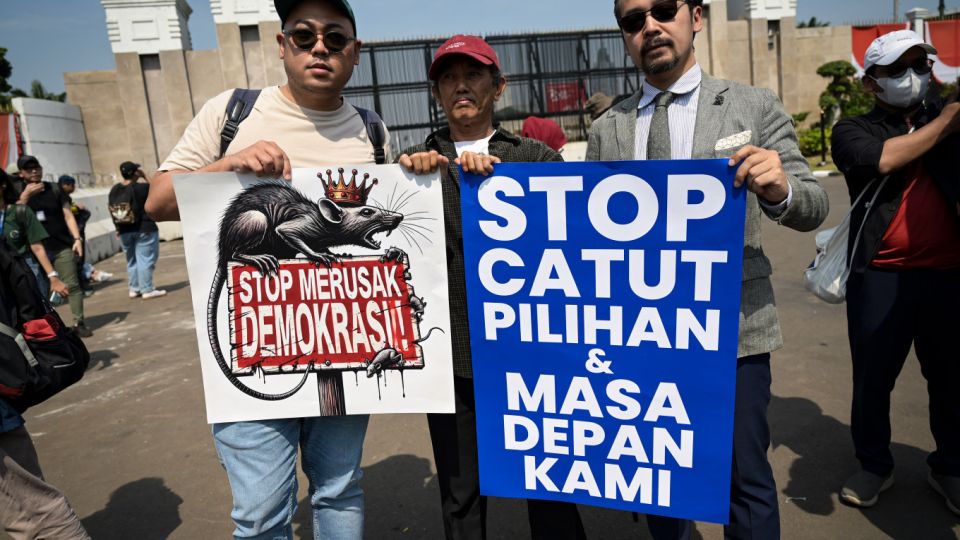August 23, 2024
JAKARTA – A political crisis in Indonesia was narrowly averted on Aug 22 with the 11th-hour cancellation of plans to pass a controversial Bill that would have prevented popular rivals of candidates supported by outgoing President Joko Widodo and President-elect Prabowo Subianto from taking part in regional elections due to be held in November.
This comes after thousands of people rallied in street demonstrations across the country in cities such as Jakarta, Bandung and Surabaya, with anti-riot police using tear gas and water cannon to disperse crowds who burned tyres and pelted stones.
There were also protests in Yogyakarta, Semarang and Makassar. Police said more than 3,000 personnel were deployed across the capital Jakarta alone, some in armoured vehicles.
In Jakarta, outside the national Parliament building, students managed to knock down its front gate and break through police barricades before Deputy Speaker Sufmi Dasco Ahmad announced late on Aug 22 that Parliament would not be passing into law the election Bill that would otherwise reinstall stricter rules on nominating candidates.
“We are not going ahead… The candidate registration for regional elections will be based on the Constitutional Court’s ruling,” Mr Dasco said. He added, however, that the regional election law may be revisited by the incoming Parliament.
The rushed Parliament sitting on Aug 22 did not manage to ratify the Bill as it failed to reach a quorum. Only 15 per cent of the 575 Members of Parliament were present at the meeting, while the rules require at least two-thirds of the House to be present to make a decision. Protesters had demanded that Parliament cancel the plan, instead of merely delaying it.
Indonesia is gearing up for regional elections on Nov 27 to fill posts for 37 provincial governors, 415 regents and 93 mayors across the archipelago.
Political parties affiliated with the nation’s two most influential leaders, Mr Widodo and Mr Prabowo, have managed to form a super coalition and sidelined numerous popular rival candidates in important regions, taking advantage of the high threshold a party or coalition of parties must meet in order to nominate a candidate.
On Aug 20, the Constitutional Court lowered the threshold for political parties or coalitions of parties to be able to nominate candidates for local heads in the November polls – from having to win 25 per cent of the popular vote to between 6.5 and 10 per cent, depending on the region’s number of registered voters.
The ruling was hailed by activists as a win for democracy as it offers a better chance to political parties and candidates opposing the dominant super coalition in key regions.
The following day, at the national Parliament, the political parties that are members of the super coalition – called the Onward Indonesia Coalition (KIM) – rushed to come up with a draft Bill putting the threshold back to 25 per cent. KIM had also aimed to get the Bill passed into law on the morning of Aug 22, amid escalating protests outside the Parliament building in Jakarta as well as other cities.
Allies of Mr Widodo, who is popularly known as Jokowi, had sought to reverse a court ruling on the law which, if successful, would block a vocal government critic of the President from running for the important post of Jakarta governor.
The move would also have paved the way for Mr Widodo’s younger son Kaesang Pangarep, 29, to run for the post of regional deputy governor in the November elections, although he would not reach the required minimum age of 30 at the time of registering to be a candidate, slated for Aug 27-29. Mr Kaesang turns 30 only in December.
The power struggle between Parliament and the Constitutional Court has sparked anger across the world’s third-largest democracy, with Mr Widodo facing mounting criticism over what analysts say are attempts to consolidate his power before he steps down on Oct 20.
Mr Prabowo’s running mate in the presidential polls and now Vice-President-elect Gibran Rakabuming Raka is Mr Widodo’s older son.
Parliament’s scrapped plans to reverse the Constitutional Court’s ruling might not put an end to the public discontent, however, as there is suspicion that lawmakers could still try to bulldoze through the legislation. Parliament has up until early next week to pass the Bill before registration for the gubernatorial and vice-gubernatorial candidates begins.
But for now, democracy activists will take the win.


